Singapore noodles. They didn’t originate in Singapore (theory is they’re Cantonese) and they were popularized by Chinese restaurants in Europe. How is that for a hodgepodge history?
Well, I’m going to blame this one on Anthony Bourdain too. I’ve been streaming No Reservations on Netflix lately and the other night I watched the Singapore episode. My mouth started to water when I saw him slurping a soup bowl full of rice vermicelli and a searingly hot pepper sauce. YUM. I’m in love with both rice vermicelli and hot sauce. So, I started Googling recipes.
Most of the recipes I found featured curry powder, which honestly, I could take or leave. I used it today because I had some but also price checked it at the store and saw that it was selling for about $5 a bottle. That’s wayyyyy too much. If you have a decently stocked spice cabinet, you can probably just make your own. Here is a good basic recipe although there are many variations (google it). My curry powder is a mild version so I just added some cayenne to make it hot. If you don’t want to use curry, this dish would be equally as delicious seasoned with just the soy sauce blend that is added at the end.
To make this recipe economical, use whatever vegetables you can purchase at a good price. The best buys at the store today were bok choy, bean sprouts, carrots and green onions. Other possibilities include: nappa or regular cabbage, bell peppers, yellow onion, mushrooms or jalapenos. You can also add fish, pork or chicken for added protein.
Special Note: This recipe makes a TON. The photos below are of a half batch that I made because I am going out of town and didn’t want a lot sitting in my fridge. The recipe is written for a full batch. I plan on making a fresh half batch in a few days to use up the rest of the ingredients.
Singapore Noodles
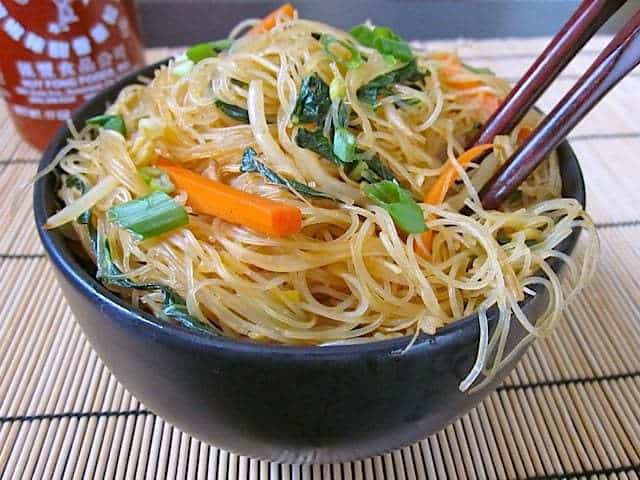
Ingredients
- 8 oz rice vermicelli noodles ($2.39)
- 1 Tbsp hot curry powder ($0.25)
- 2 cloves garlic ($0.11)
- 1 inch fresh ginger ($0.09)
- 3 Tbsp vegetable oil ($0.11)
- 1 bunch bok choy ($2.55)
- 4 medium carrots ($0.25)
- 12 oz bag bean sprouts ($1.49)
- 1 bunch green onions ($0.25)
- 1/4 cup soy sauce ($0.24)
- 1 tsp sesame oil ($0.12)
- 1 tsp chili garlic sauce, optional ($0.05)
Instructions
- Place the dry rice noodles in a bowl and cover with room temperature water. Let soak for 15 minutes. Drain in a colander after they have soaked and are softened. Return the noodles to the bowl, cut the noodles into pieces (approximately 6 inches in length) to facilitate stir frying later. Sprinkle the noodles with curry powder and toss to coat. Set noodles aside.
- While the noodles are soaking/draining/marinating in curry powder, prepare all of your vegetables. Peel and mince the garlic and ginger, julienne the carrots, wash and thinly slice the bok choy, rinse the bean sprouts and slice the green onion.
- Heat vegetable oil in a wok or large skillet over high heat. When the pan is very hot, add the garlic and ginger. Stir fry very briefly (1 minute or less) then add all of the vegetables, reserving some green onion for garnish. Stir fry the vegetables until they just begin to soften.
- Add the noodles to the hot pan and stir fry briefly (1-2 minutes). Remove the pan from the heat and stir in the soy sauce, sesame oil and chili garlic sauce. You can either add them to the pan individually or mix them all together in a bowl then stir into the dish. Taste the noodles and adjust the seasoning to your liking.
See how we calculate recipe costs here.
Nutrition
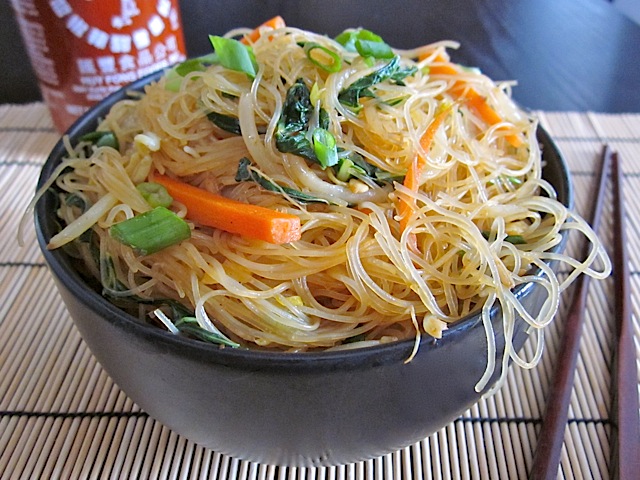
All recipes are rigorously tested in our Nashville Test Kitchen to ensure they are easy, affordable, and delicious.
Step By Step Photos
These are the rice noodles I used. I bought them at a regular grocery store in the Asian section. They could probably be bought for half the price at an Asian grocer.
Soak the rice noodles in water for about 15 minutes or until they have softened.
Drain the rice noodles well.
Put the noodles back in the bowl and cut into pieces about 6 inches long (or on a cutting board). If you don’t cut the noodles, you’ll never be able to stir fry them or mix them in with the veggies later. Sprinkle with the curry powder and toss to coat. Set the noodles aside.
While the noodles are soaking, draining and marinating with curry powder, prepare the vegetables. I have green onion, garlic, ginger, bok choy, carrot and bean sprouts. Cut everything thinly so they cook quickly.
Heat a large skillet or wok over high heat with vegetable oil. When it is very hot, add the ginger and garlic and stir fry for one minute or 30 seconds (this was so quick I couldn’t take a picture). Then add the rest of your vegetables.
Stir fry the veggies just until they begin to soften. Do not over cook them at this point, they will continue to cook as you go.
Add your softened, seasoned and cut noodles.
Stir fry the noodles for another 1-2 minutes then remove from the heat.
Mix together some soy sauce, chili garlic sauce and sesame oil.
Add the soy sauce mixture and stir in. Taste the noodles to see if you want to add more heat (chili garlic sauce), salt (soy sauce) or sesame oil.
Despite the curry powder and chili garlic sauce, I still like to top my noodles with Sriracha!!


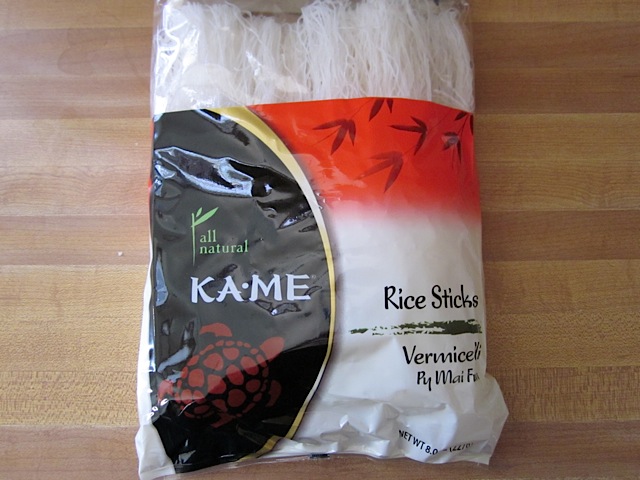
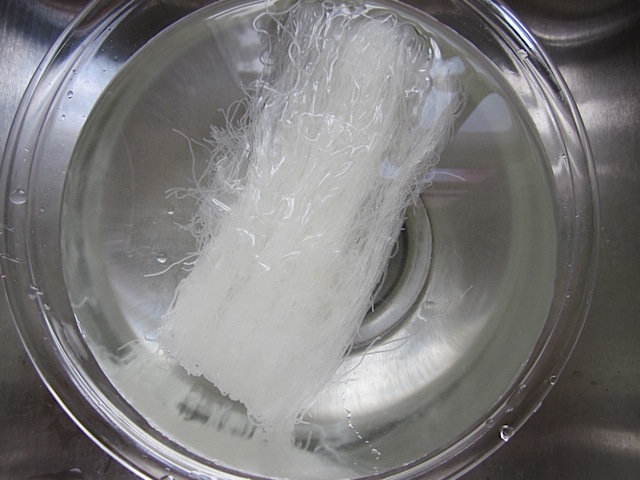

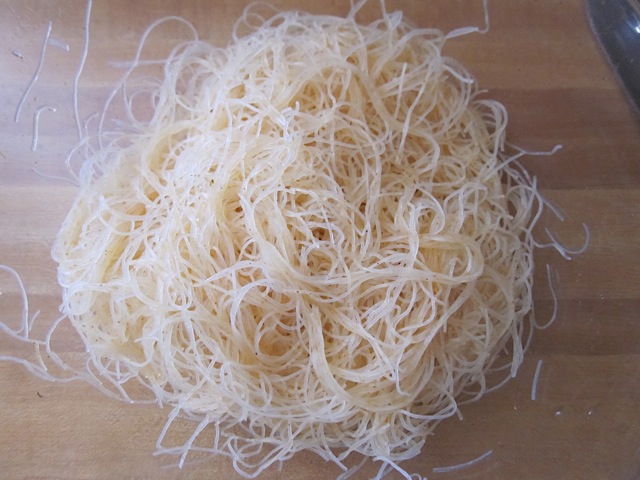
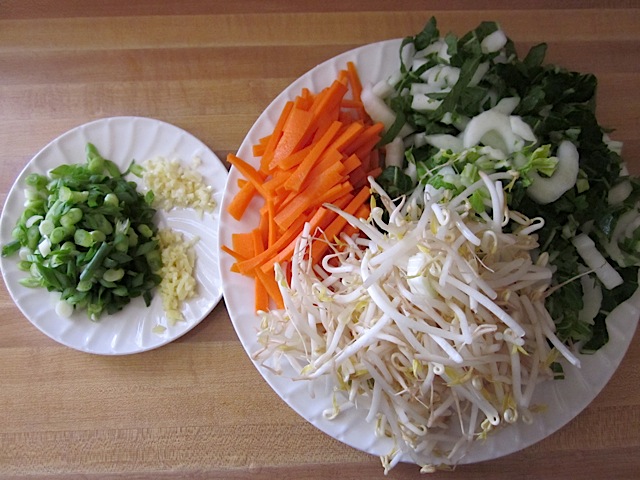
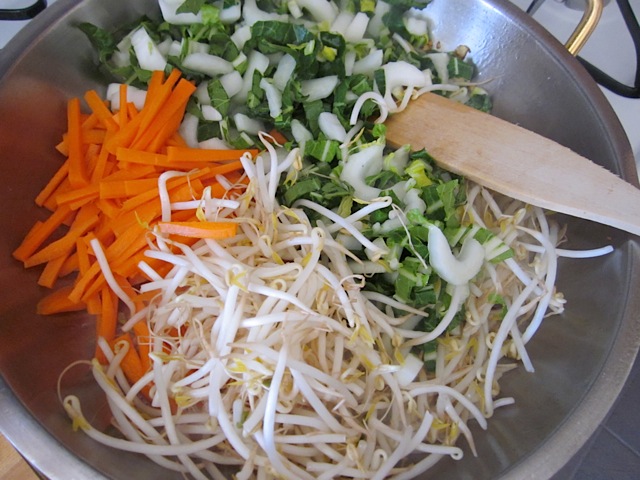

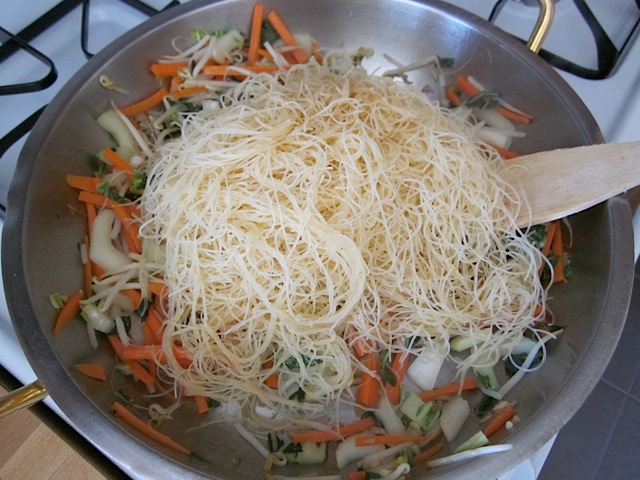
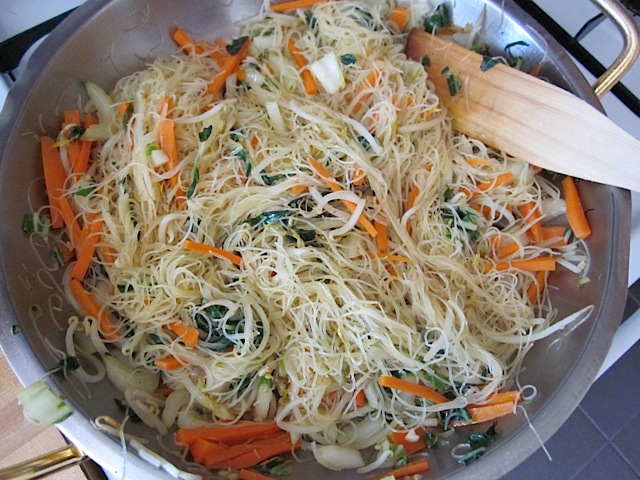
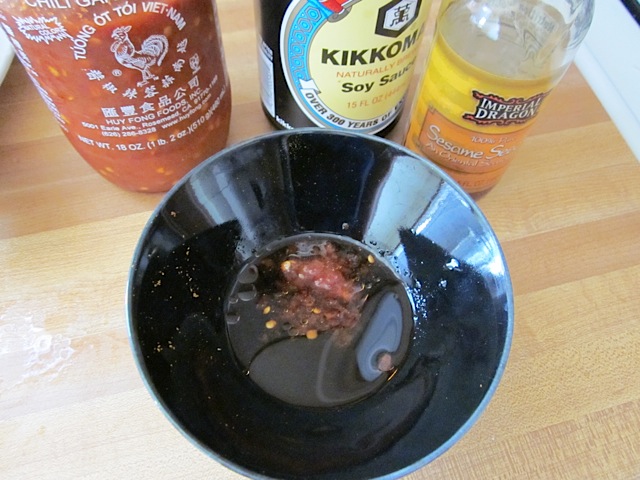

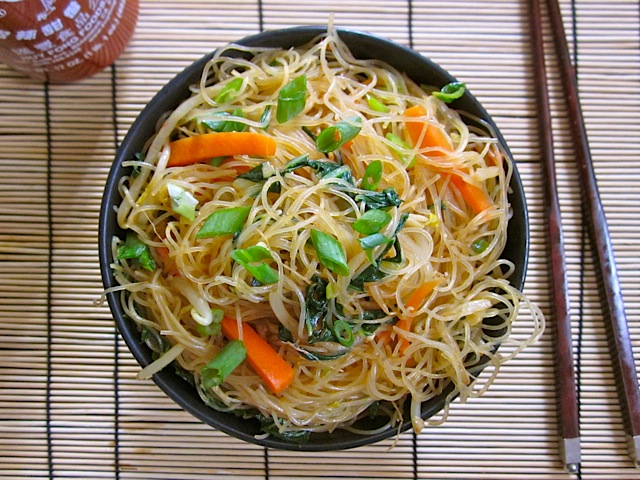
I have made many times your recipe, and is great!. I impress my friends who congratulate me a lot, LOL!. Two comments anyway:
1. I think 4 medium carrots is a lot.
2. What is a ‘bunch’ of green onions? What is a bunch on weight or quantity?
Quantity, it’s usually around 8 green onions or so. It’s really flexible so you don’t have to worry about adding an exact amount. :)
This recipe was strange, it came out pretty dry and flavorless aside from the hot curry. I even used less of the hot curry because I was worried about it overpowering. I want to try this again, and maybe add chicken stock to moisten up the noodles and add some other spices as this was really lacking in flavor.
I love this site and its recipes, but my boyfriend and I really did not like this. We ended up going to a restaurant after making it. It was bland–it didn’t taste like much oof anything besides the curry from the noodles. It was not pleasant at all, and a rare miss for this site.
Thank you very much for the recipe. It came out great, was longing to make Singapore noodles.🌻
I made this recipe for my husband and it was absolutely incredible. It is absolutely true I can never ever bike and again. Thank you so much.
Can I use regular curry powder. Hot is a no no with my littles.
Yes you could.
Yeah! Michelle to the rescue, thank you and God Bless.
Haven’t tried the recipe yet, but I just wanted to say thank you! My husband is 1/2 Japanese and loves his Asian dishes. As a SAHM I’m charged with cooking, but honestly I suck at it. Your dishes are always so easy, so good and there are so many Asian options. Thank you for helping to keep my family fed and my wonderful husband’s belly happy 😊
I added meat to this recipe, and it was perfect!!
So easy and delicious! I’m so glad I found this recipe!
I have 10 packages of vermicelli in my pantry and I had no idea what to do with them. This is on the menu tonight!!
Thanks for the super easy, super delicious looking dinner idea!
Oh so delicious! So happy to add this to my weekly recipe. My Family loved it and best of all I didn’t even have to go shopping I had everything at home! So awesome. One hour eight minutes after seeing this recipe i was calling my family to gather around the kitchen table for lunch.
I am expanding my cooking horizons. This should be very tasty and fun to make. Thank you for posting this!
Very good, a little dry, so I added chicken stock. Looking forward to making it again, next time I won’t stir the noodles so much because they broke down too much.
Just made these for dinner and they were DELICIOUS! I made them exactly as written. Thanks so much for posting the recipe.